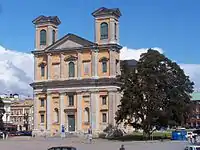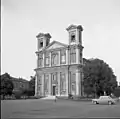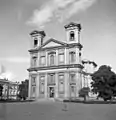Ulmus 'Atropurpurea'
The elm cultivar Ulmus 'Atropurpurea' [:dark purple] was raised from seed at the Späth nursery in Berlin, Germany, circa 1881, as Ulmus montana atropurpurea,[1][2] and was marketed there till the 1930s,[3][4] being later classed as a cultivar by Boom.[5][6] Henry (1913) included it under Ulmus montana cultivars but noted that it was "very similar to and perhaps identical with" Ulmus purpurea Hort.[2] At Kew it was renamed U. glabra Huds. 'Atropurpurea',[7] but Späth used U. montana both for wych elm and for some U. × hollandica hybrids,[8] so his name does not necessarily imply a wych elm cultivar. The Hesse Nursery of Weener, Germany, however, which marketed 'Atropurpurea' in the 1950s, listed it in later years as a form of U. glabra Huds..[9][10][11]
| Ulmus 'Atropurpurea' | |
|---|---|
| Genus | Ulmus |
| Cultivar | 'Atropurpurea' |
| Origin | Germany |
Photographs of the 'Atropurpurea' hedge at Wakehurst Place, England, though they show untypical 'pollard' leaves, appear to confirm that Späth's cultivar was similar to Ulmus purpurea Hort., probably the hybrid 'Purpurea' already in cultivation and in Späth's catalogues as U. campestris purpurea,[3][4] which he distributed separately.[12][13]
Description
Späth described his 'Atropurpurea' as having dark purple emerging shoots and leaves ("the darkest and most beautiful of the purple elms"), the foliage later turning deep green.[1] Henry noted that the leaves were folded.[2] Bean, who had the opportunity to compare mature specimens, recorded that the purple colour of 'Atropurpurea' is more lasting in the spring than that of 'Purpurea'.[14] Späth's description, however, was based on saplings raised in his nursery; it applies equally to saplings of the hybrid 'Purpurea', already in cultivation for at least three decades. Herbarium specimens of 'Atropurpurea' (see 'External links') do not appear to differ from juvenile leaves of 'Purpurea'. A wych cultivar, if such 'Atropurpurea' is, would have its seed central, not marginal, in the samara (see 'Putative specimens' below).[15]
Pests and diseases
'Atropurpurea' is not known to have any resistance to Dutch elm disease.
Cultivation
One specimen of U. montana atropurpurea was planted in 1896 at the Dominion Arboretum, Ottawa, Canada.[12] Three supplied by the Späth nursery to the Royal Botanic Garden Edinburgh in 1902 as U. montana atropurpurea may survive in Edinburgh as it was the practice of the Garden to distribute trees about the city (viz. the Wentworth Elm);[16] the current list of Living Accessions held in the Garden per se does not list the plant.[17] One planted in 1920 stood in the Ryston Hall arboretum, Norfolk,[18] in the early 20th century.[19] In the USA U. montana atropurpurea was marketed by the Klehm nursery of Arlington Heights, Illinois, in the early 20th century.[20]
A specimen labelled U. glabra 'Atropurpurea' at Wakehurst Place survives by being treated as a hedging plant, too low to attract the attentions of the Scolytus beetles that act as vectors of Dutch elm disease. 'Atropurpurea', with seed central, not marginal, in the samara and a deeper and more lasting purple coloration on mature shoots than that of hybrid 'Purpurea', is present in Drottningholmsvägen, Stockholm.[21]
Putative specimens
Two large old elms, about 18 m tall, with a deeper purple spring coloration than hybrid 'Purpurea', misnamed locally U. procera 'Purpurea', flanked the Fredrikskyrkan in central Karlskrona, Sweden, till 27 October 2006,[22] when they fell during a storm.[23]
 Fredrikskyrkan purple-leaved elm, Karlskrona, June 2004
Fredrikskyrkan purple-leaved elm, Karlskrona, June 2004 Fredrikskyrkan purple-leaved elms Karlskrona, 2004
Fredrikskyrkan purple-leaved elms Karlskrona, 2004 Same, 1960
Same, 1960 Same, 1944
Same, 1944
Synonymy
References
- Späth, L. cat. 79, 1890-91 (Berlin 1890), p.114
- Elwes, Henry John; Henry, Augustine (1913). The Trees of Great Britain & Ireland. 7. p. 1868.
- Katalog (PDF). 108. Berlin, Germany: L. Späth Baumschulenweg. 1902–1903. pp. 132–133.
- Späth, Ludwig (1930). Späth-Buch, 1720-1930. Berlin: Self published. pp. 311–313, 351–352.
- kiki.huh.harvard.edu
- Boom, B. K., Nederlandse Dendrologie 1: 157, 1959
- Green, Peter Shaw (1964). "Registration of cultivar names in Ulmus". Arnoldia. Arnold Arboretum, Harvard University. 24 (6–8): 41–80. Retrieved 16 February 2017.
- RBGE Späth list 1902
- Hesse, Hermann Albert (1932). Preis- und Sortenliste. pp. 96–97. Retrieved 18 January 2018.
- Hesse, Hermann Albert (1933). Preis- und Sortenliste. pp. 91–92. Retrieved 27 February 2018.
- Hesse, Hermann A., Hauptkatalog 1956/57 (Weener, Ems, 1956); p.141-142
- Saunders, William; Macoun, William Tyrrell (1899). Catalogue of the trees and shrubs in the arboretum and botanic gardens at the central experimental farm (2 ed.). pp. 74–75.
- Elwes, Henry John; Henry, Augustine (1913). The Trees of Great Britain & Ireland. 7. p. 1868.
- Bean, W. J. (1936) Trees and shrubs hardy in Great Britain, 7th edition, Murray, London, vol. 2, p.618
- Coleman, M (ed.). (2009). Wych Elm. Royal Botanic Garden Edinburgh. ISBN 978-1-906129-21-7.
- Accessions book. Royal Botanic Garden Edinburgh. 1902. pp. 45, 47.
- "List of Living Accessions: Ulmus". Royal Botanic Garden Edinburgh. Retrieved 21 September 2016.
- rystonhall.co.uk/
- Ryston Hall Arboretum catalogue. c. 1920. pp. 13–14.
- Klehm's Nurseries, Season of 1910, Arlington Heights, Illinois, 1910, p.12
- www.tradgardsakademin.se
- Photographs of fallen purple elms, Fredrikskyrkan, Karlskrona, 28 October 2006: karlskronabloggen.se/2013/03/19/minns-ni-tradraset-vid-fredrikskyrkan
- Lars Lagerstedt, 'Almar i Sverige', Lustgarden, 2014, p.60, p.76, p.71
- Bean, W. J. (1988) Trees and shrubs hardy in Great Britain, 8th edition, Murray, London, p.640.
External links
- "Herbarium specimen BR0000027730669V". Botanic Garden, Meise. Sheet labelled Ulmus montana var. atropurpureum, Jardin Botanique de Liège (C. Aigret; 1904)
- "Herbarium specimen - L.1587113". Botany catalogues. Naturalis Biodiversity Center. Sheet described as Ulmus gabra Huds. cv. 'Atropurpurea' (Spaeth)